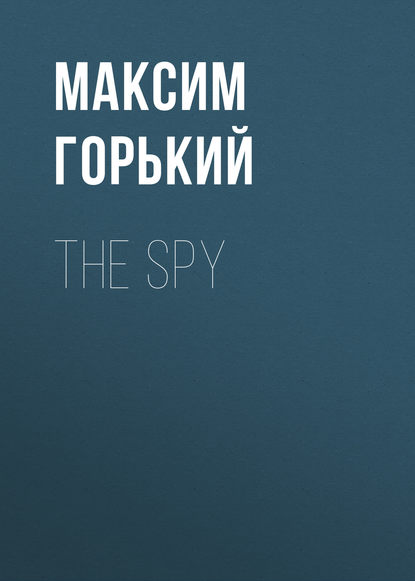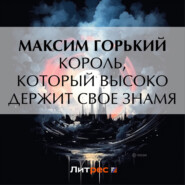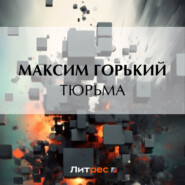По всем вопросам обращайтесь на: info@litportal.ru
(©) 2003-2024.
✖
The Spy
Настройки чтения
Размер шрифта
Высота строк
Поля
But he disappeared without waiting for the information he wanted, and Viekov ran after him.
Yevsey closed his eyes for a minute, in order to try in the darkness to get at the meaning of what had been told him. He could easily represent to himself a mass of people walking through the streets in a sacred procession, but since he could not understand why the soldiers had shot at them, he was skeptical about the affair. However, the general agitation seized him, too, and he felt disturbed and ill at ease. He wanted to bustle about with the spies, but unable to make up his mind to approach those he knew, he merely retreated still farther into his corner.
Many persons passed by him, all of whom, he fancied, were quickly searching for a little cosy corner where they might stand to collect their thoughts.
Maklakov appeared. He remained near the door with his hands thrust into his pockets, and looked sidewise at everybody. Melnikov approached him.
"Did they do it on account of the war?"
"I don't know."
"For what else? If it was the people. But maybe it was simply some mistake. Eh? What did they ask for, do you know?"
"A constitution," replied Maklakov.
The sullen spy shook his head.
"I don't believe it."
"As you please."
Then Melnikov turned heavily, like a bear, and walked away grumbling:
"No one understands anything. They stir about, make a big noise – "
Yevsey went up to Maklakov, who was looking at him.
"What is it?"
"I have a report."
Maklakov waved him aside.
"Who wants to bother about reports to-day."
Yevsey drew still nearer, and asked:
"Timofey Vasilyevich, what does 'constitution' mean?"
"A different order of life," answered the spy in a low voice.
Solovyov, perspiring and red, came running up.
"Have you heard whether they are going to send us to St. Petersburg?"
"No, I haven't."
"I think they probably will. Such an event! Why, it's a revolt, a real revolt."
"To-morrow we will know."
"How much blood has been shed! What is it?"
Maklakov's eye ran about uneasily. To-day his shoulders seemed more stooping than ever, and the ends of his mustache dropped downward.
Something seemed to be revolting in Yevsey's brain, and Maklakov's grim words kept repeating themselves.
"A different order of life – different."
They gripped at his heart, arousing a sharp desire to extract their meaning. But everything around him turned and darted hither and thither. Melnikov's angry, resonant voice sounded sickeningly:
"The thing is, to know what people did it. The working-people are one thing, simply residents another. This differentiation must be made."
And Krasavin spoke distinctly:
"If even the people begin to revolt against the Czar, then there are no people any more, only rebels."
"Wait, and suppose there's deception here."
"Hey, you old devil," whispered Zarubin, hastening up to Yevsey. "I've struck a vein of business. Come on, I'll tell you."
Klimkov followed him in silence for a space, then stopped.
"Where shall I go?"
"To a beer saloon. You understand? There's a girl there, Margarita. She has an acquaintance, a milliner. At the milliner's lodging they read books on Saturdays – students and various other people like that. So I'm going to cut them up. Ugh!"
"I won't go," said Yevsey.
"Oh, you! Ugh!"
The long ribbon of strange impressions quickly enmeshed Yevsey's heart, hindering him from an understanding of what was happening. He walked off home unobserved, carrying away with him the premonition of impending misfortune, a misfortune that already lay in hiding and was stretching out irresistible arms to clutch him. It filled his heart with new fear and grief. In expectation of this misfortune he endeavored to walk in the obscurity close against the houses. He recalled the agitated faces and excited voices, the disconnected talk about death, about blood, about the huge graves, into which dozens of bodies had been flung like rubbish.
At home he stood at the window a long time looking at the yellow light of the street-lamp. The pedestrians quickly walked into the circle of its light, then plunged into the darkness again. So in Yevsey's head a faint timid light was casting a pale illumination upon a narrow circle, into which ignorant, cautious grey thoughts, helplessly holding on to one another like blind people, were slowly creeping. Small and lame they gathered into a shy group driven into one place like a swarm of mosquitoes. But suddenly, losing hold of the bond uniting them, they disappeared without leaving a trace, and his soul devoid of them remained like a desert illuminated by a solitary ray from a sorrowful moon.
The days passed as in a delirium, filled with terrible tales of the fierce destruction of people. For Yevsey these days crawled slowly over the earth like black eyeless monsters, swollen with the blood they had devoured. They crawled with their huge jaws wide open, poisoning the air with their stifling, salty odor. People ran and fell, shouted and wept, mingling their tears with their blood. And the blind monster destroyed them, crushed old and young, women and children. They were pushed forward to their destruction by the ruler of their life, fear, – fear leaden-grey as a storm-cloud, powerful as the current of a broad stream.
Though the thing had happened far away, in a strange city, Yevsey knew that fear was alive everywhere. He felt it all over, round about him.
No one understood the event, no one was able to explain it. It stood before the people like a huge riddle and frightened them. The spies stuck in their meeting places from morning until night, and did much reading of newspapers and drinking of whiskey. They also crowded into the Department of Safety, where they disputed, and pressed close against one another. They were impatiently awaiting something.
"Can anybody explain the truth?" Melnikov kept asking.
One evening a few weeks after the event there was a meeting of the spies in the Department of Safety at which Sasha delivered a speech.
"Stop this nonsensical talk," he said sharply. "It's a scheme of the Japs. The Japs gave 18,000,000 rubles to Father Gapon to stir the people up to revolt. You understand? The people were made drunk on the road to the palace; the revolutionists had ordered a few wine shops to be broken into. You understand?" He let his red eyes rove about the company as if seeking those of his listeners who disagreed with him. "They thought the Czar, loving the people, would come out to them. And at that time it was decided to kill him. Is it clear to you?"
"Yes, it's clear," shouted Yakov Zarubin, and began to jot something down in his note-book.
Yevsey closed his eyes for a minute, in order to try in the darkness to get at the meaning of what had been told him. He could easily represent to himself a mass of people walking through the streets in a sacred procession, but since he could not understand why the soldiers had shot at them, he was skeptical about the affair. However, the general agitation seized him, too, and he felt disturbed and ill at ease. He wanted to bustle about with the spies, but unable to make up his mind to approach those he knew, he merely retreated still farther into his corner.
Many persons passed by him, all of whom, he fancied, were quickly searching for a little cosy corner where they might stand to collect their thoughts.
Maklakov appeared. He remained near the door with his hands thrust into his pockets, and looked sidewise at everybody. Melnikov approached him.
"Did they do it on account of the war?"
"I don't know."
"For what else? If it was the people. But maybe it was simply some mistake. Eh? What did they ask for, do you know?"
"A constitution," replied Maklakov.
The sullen spy shook his head.
"I don't believe it."
"As you please."
Then Melnikov turned heavily, like a bear, and walked away grumbling:
"No one understands anything. They stir about, make a big noise – "
Yevsey went up to Maklakov, who was looking at him.
"What is it?"
"I have a report."
Maklakov waved him aside.
"Who wants to bother about reports to-day."
Yevsey drew still nearer, and asked:
"Timofey Vasilyevich, what does 'constitution' mean?"
"A different order of life," answered the spy in a low voice.
Solovyov, perspiring and red, came running up.
"Have you heard whether they are going to send us to St. Petersburg?"
"No, I haven't."
"I think they probably will. Such an event! Why, it's a revolt, a real revolt."
"To-morrow we will know."
"How much blood has been shed! What is it?"
Maklakov's eye ran about uneasily. To-day his shoulders seemed more stooping than ever, and the ends of his mustache dropped downward.
Something seemed to be revolting in Yevsey's brain, and Maklakov's grim words kept repeating themselves.
"A different order of life – different."
They gripped at his heart, arousing a sharp desire to extract their meaning. But everything around him turned and darted hither and thither. Melnikov's angry, resonant voice sounded sickeningly:
"The thing is, to know what people did it. The working-people are one thing, simply residents another. This differentiation must be made."
And Krasavin spoke distinctly:
"If even the people begin to revolt against the Czar, then there are no people any more, only rebels."
"Wait, and suppose there's deception here."
"Hey, you old devil," whispered Zarubin, hastening up to Yevsey. "I've struck a vein of business. Come on, I'll tell you."
Klimkov followed him in silence for a space, then stopped.
"Where shall I go?"
"To a beer saloon. You understand? There's a girl there, Margarita. She has an acquaintance, a milliner. At the milliner's lodging they read books on Saturdays – students and various other people like that. So I'm going to cut them up. Ugh!"
"I won't go," said Yevsey.
"Oh, you! Ugh!"
The long ribbon of strange impressions quickly enmeshed Yevsey's heart, hindering him from an understanding of what was happening. He walked off home unobserved, carrying away with him the premonition of impending misfortune, a misfortune that already lay in hiding and was stretching out irresistible arms to clutch him. It filled his heart with new fear and grief. In expectation of this misfortune he endeavored to walk in the obscurity close against the houses. He recalled the agitated faces and excited voices, the disconnected talk about death, about blood, about the huge graves, into which dozens of bodies had been flung like rubbish.
At home he stood at the window a long time looking at the yellow light of the street-lamp. The pedestrians quickly walked into the circle of its light, then plunged into the darkness again. So in Yevsey's head a faint timid light was casting a pale illumination upon a narrow circle, into which ignorant, cautious grey thoughts, helplessly holding on to one another like blind people, were slowly creeping. Small and lame they gathered into a shy group driven into one place like a swarm of mosquitoes. But suddenly, losing hold of the bond uniting them, they disappeared without leaving a trace, and his soul devoid of them remained like a desert illuminated by a solitary ray from a sorrowful moon.
The days passed as in a delirium, filled with terrible tales of the fierce destruction of people. For Yevsey these days crawled slowly over the earth like black eyeless monsters, swollen with the blood they had devoured. They crawled with their huge jaws wide open, poisoning the air with their stifling, salty odor. People ran and fell, shouted and wept, mingling their tears with their blood. And the blind monster destroyed them, crushed old and young, women and children. They were pushed forward to their destruction by the ruler of their life, fear, – fear leaden-grey as a storm-cloud, powerful as the current of a broad stream.
Though the thing had happened far away, in a strange city, Yevsey knew that fear was alive everywhere. He felt it all over, round about him.
No one understood the event, no one was able to explain it. It stood before the people like a huge riddle and frightened them. The spies stuck in their meeting places from morning until night, and did much reading of newspapers and drinking of whiskey. They also crowded into the Department of Safety, where they disputed, and pressed close against one another. They were impatiently awaiting something.
"Can anybody explain the truth?" Melnikov kept asking.
One evening a few weeks after the event there was a meeting of the spies in the Department of Safety at which Sasha delivered a speech.
"Stop this nonsensical talk," he said sharply. "It's a scheme of the Japs. The Japs gave 18,000,000 rubles to Father Gapon to stir the people up to revolt. You understand? The people were made drunk on the road to the palace; the revolutionists had ordered a few wine shops to be broken into. You understand?" He let his red eyes rove about the company as if seeking those of his listeners who disagreed with him. "They thought the Czar, loving the people, would come out to them. And at that time it was decided to kill him. Is it clear to you?"
"Yes, it's clear," shouted Yakov Zarubin, and began to jot something down in his note-book.

















